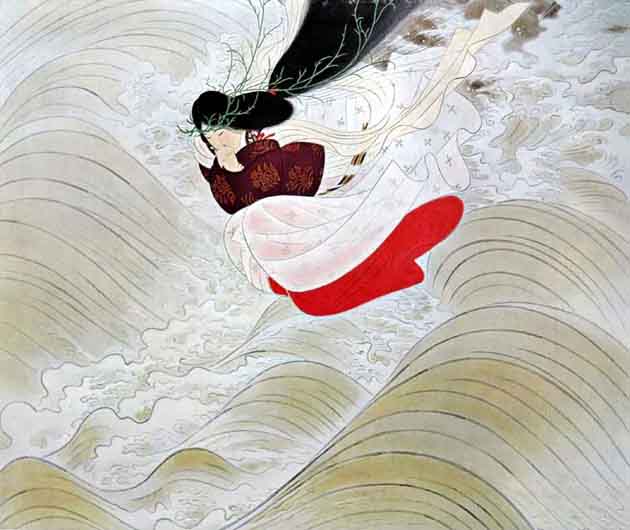In 1945, immediately after the War, the GHQ-SCAP gave the Japanese Government a directive titled “Regarding the abolition of government protection, support, supervision and proliferation of State Shintô or shrine Shintô”, or simply called “The Shintô Directive”, and ordered to stop supporting the Shintô religion. They thought that the Shintô had been used to legitimate the militaristic and ultra-nationalistic ideology of prewar Japan. They forbade the following four doctrines:
- The doctrine that the Emperor of Japan is superior to the heads of other states because of ancestry, descent, or special origin.
- The doctrine that the people of Japan are superior to the heads of other states because of ancestry, descent, or special origin.
- The doctrine that the islands of Japan are superior to the heads of other states because of ancestry, descent, or special origin.
- Any other doctrine which tends to delude the Japanese people into embarking upon wars of aggression or to glorify the use of force as an instrument for the settlement of disputes with other people.

In the article four, they made a big mistake. The war was not a result of the Shintô, or the traditionalism, but of the modernization. The Shintô gave a form for the action of the soldiers. We say “Itadakimasu!” (With gratefulness!) before we eat. This is a Shintô ritual. The soldiers cried, “Tennnô-heika banzai!” (Long live, his Majesty the Emperor!) when they charged. This is also a Shintô ritual. Even Kamikaze, the Death Commando, also was a tradition. We know many stories of the soldiers who died for the Emperor. The oldest we know is a lady, Princess Oto-tachibana who died for her husband, Prince Yamato-takeru. The story was told in Kojiki, an ancient anthology of myths published in 712, C.E.
When His Augustness Prince Yamato-takeru thence proceed to Azuma and crossed the bay of Hashiri-midzu, the deity of the sea raised the waves, tossing the ship so that they could not advance forward. Then Yamato-takeru‘s wife, whose name was Her Augustness Princess Oto-tachibana, said: “I will enter the sea instead of the august child. The august child must complete the service on which he has been sent, and take back a report to the Heavenly Sovereign.” When she was about to enter the sea, she spread eight thicknesses of sedge rugs, eight thicknesses of skin rugs, and eight thicknesses of silk rugs on the top of the waves, and sat down on the top of them. Thereupon the violent waves at once went down, and the august ship was able to proceed. Then the Princess sang:
Standing in the midst
of the flames of the fire
burning on the moor of Sagamu
thou inquired the safety of me,
the august child, my dear.sanesashi
sagamu no ono ni
moyuru hi no
honaka ni tachite
tohisi kimi hamoSo seven days afterward the Princess’ comb drifted on to the beach – which comb was forthwith taken and placed in an august mausoleum which was made. [1]
Once it was the greatest honor to die for the Emperor, because it had the totally same meaning as to defend the Japanese state, people and culture. This idea gave a form to the battle. It was the formal cause and the final cause of the war. The material cause and efficient cause were in another place, in the Western modern culture.
The worst thing that the GHQ-SCAP did to Japan was to uproot the sense of honor from people. If we have the sense of honor based on the Shintô, we cannot be aggressive. In every martial arts in Japan, Jûdô, Karate, Aikidô and Kendô, an aggressive attack is forbidden. Those arts should be used only for defense. On the contrary, as far as we follow the Western way of living, we should be aggressive, like boxing. That is the nature of the Western modern culture. Unfortunately, we cannot discard the Western modern culture. Our possible choices are to live with or without our tradition. I firmly stand for the tradition, the Shintô.
Incidentally, I am a Buddhist. At the same time, I can live in the Shintô civilization. Buddhism relates to the personal salvation. The Shintô is an official mater. It relates to the national rituals. We say, “Itadakimasu!” before meal. To whom we are grateful? To the Emperor, whose ancestors taught our ancestors how to make rice. Still now, His Majesty the Emperor prays to Divines for a good harvest every day. The Shintô gives us a form of life. It gives us the sense of beauty.
I hate the war. I love peace. But if I battle, I must be brave and honorable as a son of Japan. This is a problem of the sense of beauty. We, Japanese, should regain our sense of beauty, I believe.
[1] Translated by the quoter, referring to a translation by B.H. Chamberlain, 1882, in http://www.sacred-texts.com/shi/kojiki.htm

